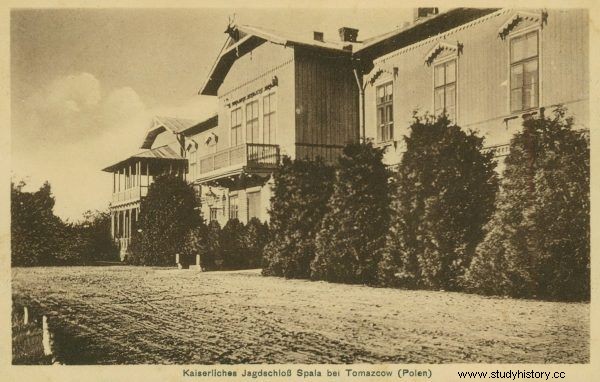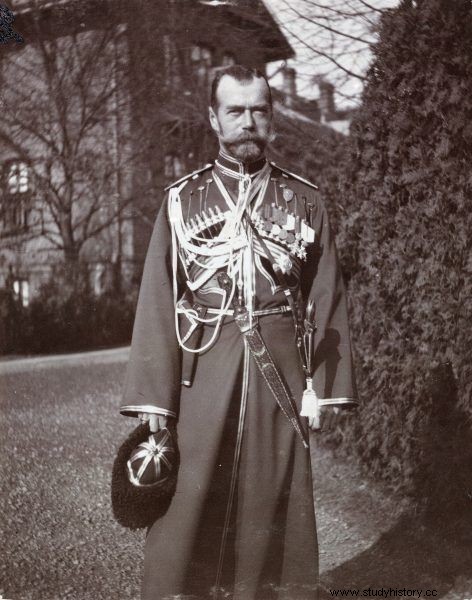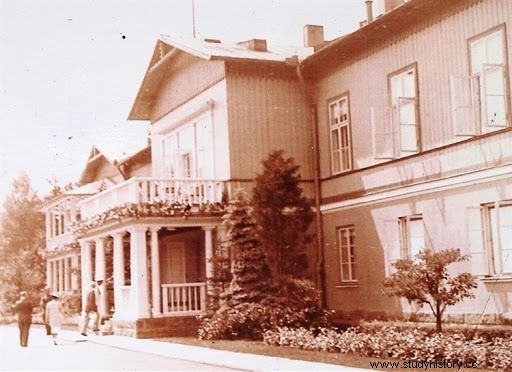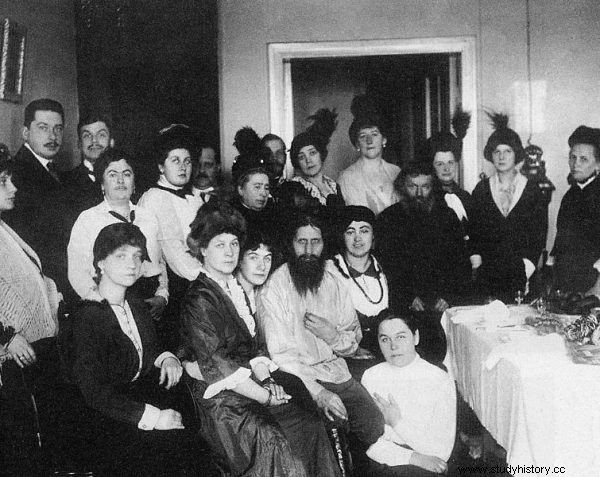The stunning career of Grigory Rasputin at the tsarist court began ... in Poland. More specifically, in the imperial residence in Spała, then located in the Kingdom of Poland. It was there in the fall of 1912 that this Siberian peasant won the trust of Tsarina Alexandra and her husband Nicholas II.
This property was built in 1884 by the father of Nicholas II - Alexander III, who loved hunting in these areas. Besides, in Spała, lost among the dense forests, he could only spend time with his loved ones, because, as reported by Queen Victoria's envoy at the Russian court, Alexander III was "an exceptionally family man, very attached to his wife and children."
After the death of his father in 1894, Nicholas II came to Spała with his wife and his growing family….
That awful hemophilia
Nicholas and Aleksandra married out of great love in November 1894. A year later, their daughter Olga was born to them, in 1897 - Tatiana, in 1899 - Maria, in 1901 - Anastasia. Parents loved their girls, but all of Russia was waiting for the birth of a son and heir to the throne.

The palace in Spała
Alexa's son was not born until July 30, 1904. In September, the boy started bleeding from his navel and the doctors diagnosed him with haemophilia, a hereditary blood clotting failure. He may have bled out due to a banal bruise or sneeze. Aleksandra turned out to be a carrier of the disease, as did her mother Alice, the Grand Duchess of Hesse, and her grandmother, Queen Victoria. It was the British monarch - most likely as a result of a spontaneous gene mutation - that passed the defective gene to her female descendants.
The Empress's entire life was filled with fear for her son's health. There was often painful internal bleeding following a slight blow or fall of Alexius. Then Alexandra sat by the bed of a writhing child, brushing strands of hair from his sweaty forehead.
Our friend Rasputin
The emperor accepted his son's illness as God's will, but his wife was not going to give up. In 1905, Rasputin appeared in the life of the imperial family. He was an ordinary Russian peasant who suddenly, at the age of 14, heard mysterious voices, experienced a spiritual revelation and became very pious. However, after a while, he returned to normal and got married. Twenty years later, these "voices" visited him again, so Rasputin gave up his life so far and became a pilgrim. He visited holy places, fasted, searched for the truth, traveled thousands of kilometers on foot, and the peasants willingly gave him shelter. He told them about his travels, warned them against the omnipresent devil, and foretold the future. He preached that one should not fear sin, because after committing a sinful act, first there is suffering, then repentance, and finally cleansing. The prayer was to prepare the soul to receive the Holy Spirit, and then "every man can become Christ, every woman the Mother of God".
Such teaching suited simple Russian peasants. Soon even the church hierarchs found themselves under the influence of Rasputin, and one of them gave him a letter of recommendation to the rector of the St. Petersburg Theological Seminary. In the capital, Grigory caused a sensation and was popular with aristocrats. New acquaintances allowed Rasputin to reach relatives of Nicholas and Alexandra, who introduced him to the tsarist couple in November 1905.

Nicholas II in Spała
At first, the emperor and his wife saw him as the embodiment of a simple Russian peasant. Then the empress began to ask him for prayers for the health of her son. It soon became apparent that Rasputin could inexplicably stem the heir's bleeding even when the doctors spread their hands helplessly.
Alexei's disease was a best kept secret, so neither the Romanov family nor St. Petersburg's elite knew the reason for the presence of this "dirty Siberian musik" at the tsarist court. Rasputin's constant libations also negatively affected the reputation of the emperor and his wife.
In the summer of 1912, Nicholas II bowed to family pressure and sent Rasputin to his native village of Pokrovskoye. But in October Grigory returned to favor…
The Pałski crisis
In September, the Romanovs went to their residence in Białowieża, where 8-year-old Aleksy hit his hip while getting off the boat. This event caused his mother to panic, but soon the boy's condition improved so much that they all went to Spała. The boy was well on his way to recovery and was even starting to walk.
On October 2, Aleksandra decided that a ride in an open carriage on a beautiful sunny day would be good for her son. But the boy was painful to ride on uneven surfaces, and after a few minutes Alexey began to complain of malaise. The Tsarina ordered a ride to the palace. "The way back seems to be a real nightmare to me - recalled Anna Wyrubowa, a friend of the Empress - Every movement of the carriage, every unevenness on the road caused unimaginable suffering [...] the boy was unconscious with pain ”.

It was in Spała that the greatest health crisis of the young prince took place
The patient's condition worsened by the hour. The doctors who came from St. Petersburg turned out to be powerless. Nicholas II described the course of Alexius' illness as follows:
The poor little baby was suffering terribly - the pain attacked with terrible contractions that repeated about every 15 minutes. All day and night, Alexius was delirious with a fever and sat up in bed, which in turn caused an immediate attack of pain. In fact, he couldn't even cry and only groaned repeating:Lord have mercy on us!
On October 8, the boy's body temperature reached 40.5 degrees, and his pulse was barely perceptible. The priest gave him the last rites. At that time, Alexander made everyone stupor by sending a telegram asking for help to Rasputin, who was in Siberia. He replied:"God heard your prayers and saw your tears. Do not be afraid. Your son will live. " The tsarina told her entourage:“Doctors are not seeing improvement yet, but I'm not worried at all. I got a telegram from Father Grigory last night and now I feel calm. ”
Indeed, after just an hour, Alexius's condition began to improve. The bleeding stopped within 24 hours. A tsarist physician named Fedorov admitted:"Recovery is completely inexplicable from a medical point of view."
By saving the boy's life, Rasputin won the Empress's boundless trust, who saw hope for herself and Alexius in this simple Siberian peasant.
Aftermath
From now on, Aleksandra will divide people into two categories:supporters and opponents of her favorite. If in peacetime the intimacy of the Tsarina and Rasputin was irritating, then after the outbreak of World War I, the empress's dependence on Grigory became dangerous.
In August 1915, Nicholas II nominated himself to be the commander-in-chief of the Russian army. He left for the rate in Mogilev, and state affairs were taken into the hands of Alexander. Her chief adviser was Rasputin who scared her:
Remember that I don't need you or the emperor [...] If you betray me, I can do it, but your son will get hurt.

Rasputin and his followers (1914)
Nicholas loved his wife very much and trusted her in all matters, not wanting to see her disastrous influence on the affairs of the state. He ignored the fact that her spouse was dismissing ministers devoted to her monarch only because they did not like Rasputin. This is how Grigory became the most disliked person in all of Russia.
In December 1916, Rasputin was murdered. but the reputation of Aleksandra and her husband could not be saved. The Siberian old man became one of the causes of the fall of the dynasty, although war fatigue, German propaganda and the deteriorating economic situation were also of great importance.
Bibliography:
Wiernicka V., "Russians in Poland. Time of partitions:1795-1915 ”. Warsaw, 2015
